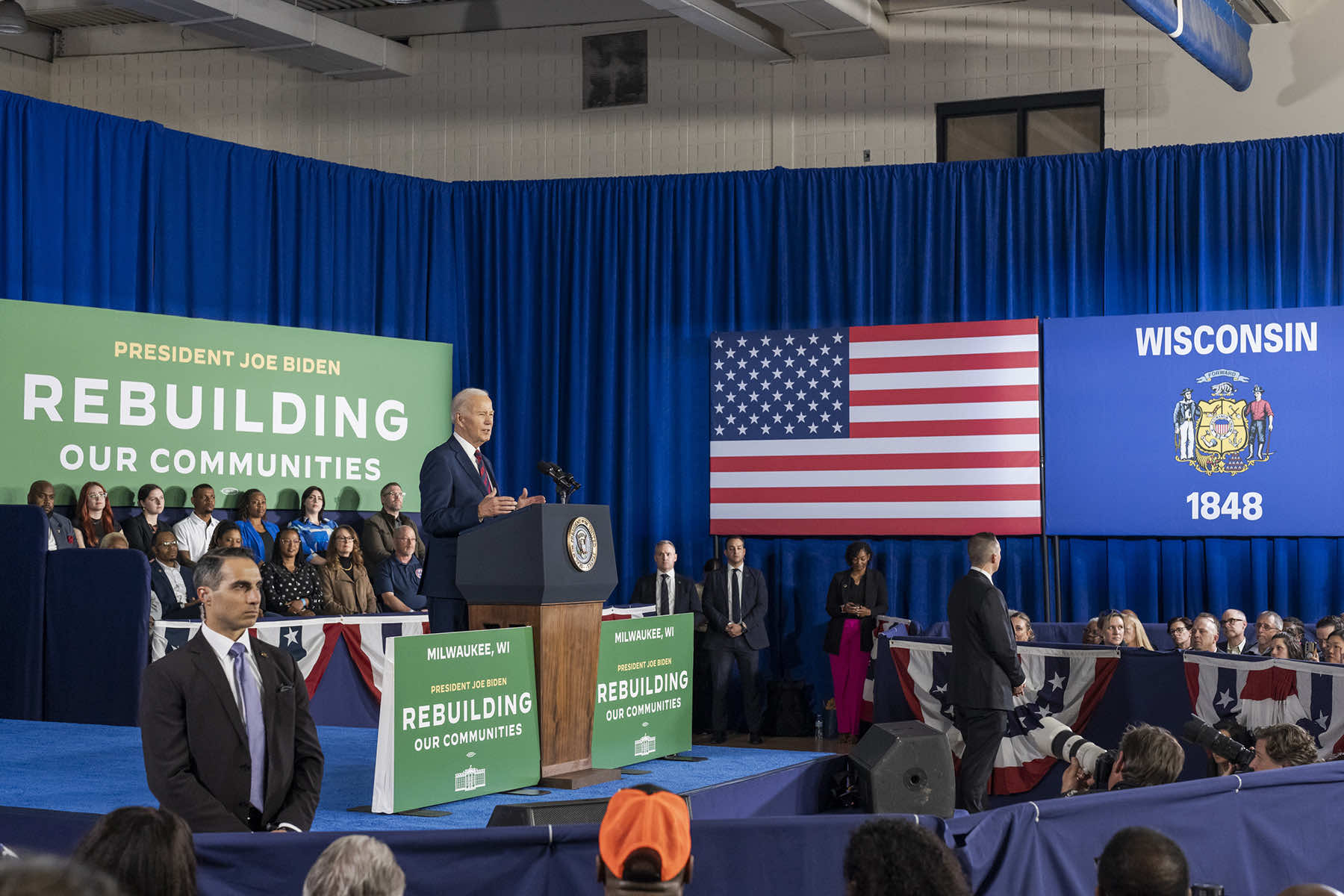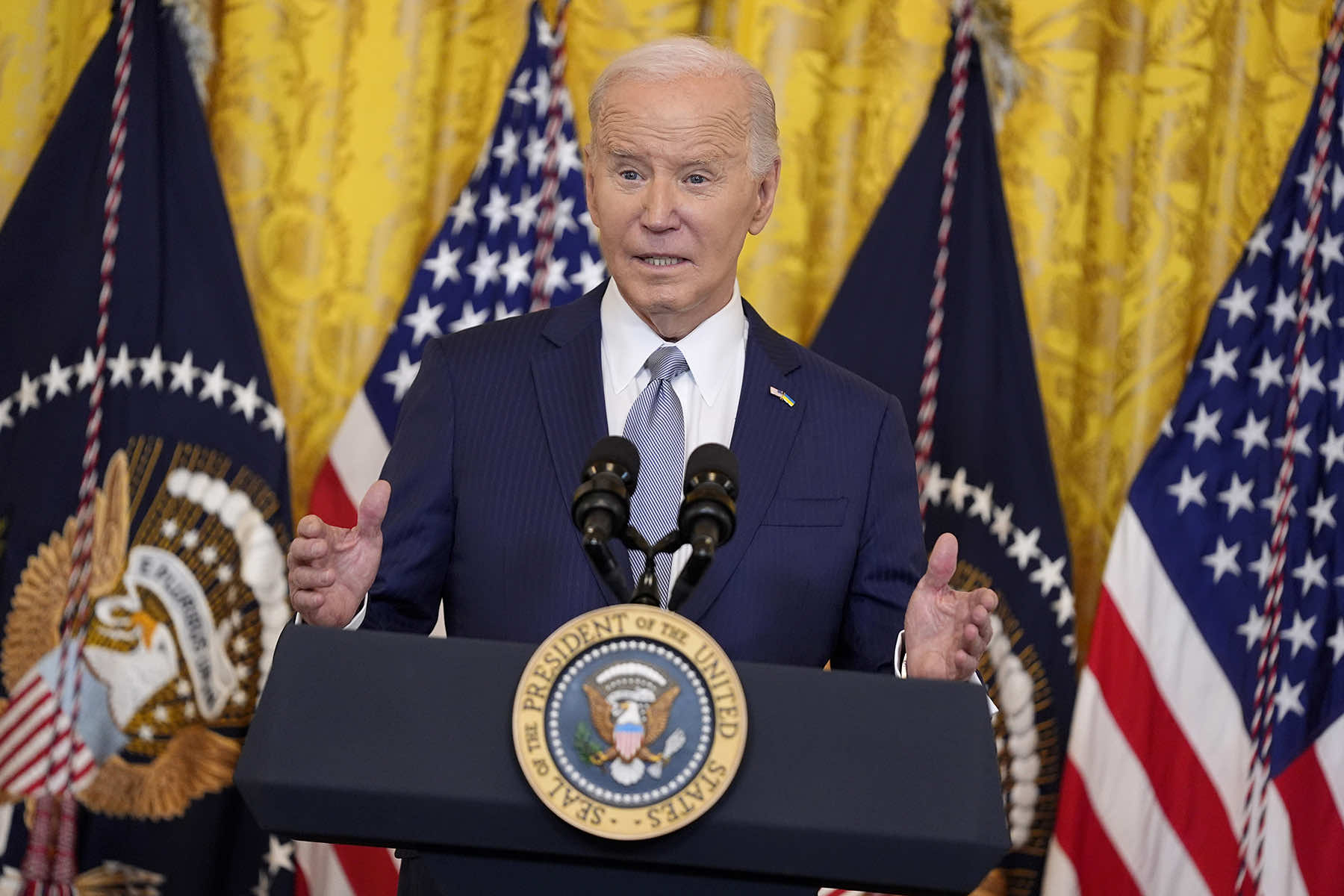
May 13 was a day that illustrated why the Democrats have become America’s cheerleaders, emphasizing how investment in the nation’s infrastructure has created jobs and rebuilt the country.
The Biden-Harris administration has been touting its investments in rebuilding roads and bridges, making sure Americans have clean water, getting rid of pollution, expanding access to high-speed internet, and building a clean energy economy, contrasting that success with Trump’s eternal announcements of an “Infrastructure Week” that never came.
The White House announced that it has awarded nearly $454 billion in funding from the Bipartisan Infrastructure Law, including more than 56,000 projects across more than 4,500 communities across the nation. Those include fixing more than 165,000 miles of roads and more than 9,400 bridges and improving more than 450 ports and 300 airport terminals.
It has funded more than 1,400 drinking water and wastewater projects and projects to replace up to 1.7 million toxic lead pipes, as well as more than 8,000 low- and zero-emission buses. It has funded 95 previously unfunded Superfund projects to clean up contaminated sites. It has improved the electrical grid and funded 12,000 miles of high-speed internet infrastructure, and exposed internet junk fees.
The White House explained that this investment is making it cheaper to install clean energy technology and lowering families’ monthly energy bills, and highlighted the available rebates to enable people to take advantage of the new technologies.
On May 8, a report from the Semiconductor Industry Association and the Boston Consulting Group explored the “breathtaking speed,” as the president of the semiconductor organization put it, at which the industry is growing. In the Financial Times on May 9, John Thornhill reported that the CHIPS and Science Act, which provided a $39 billion investment in the semiconductor industry, has “primed a torrent of private sector investment.”
With the influx of both federal money and an additional $447 billion of private investment in 83 projects in 25 states, the report forecasts that the U.S. will increase its share of global manufacturing capacity for leading-edge chips from today’s rate of 0% to 28% by 2032. Thornhill compared this investment to that spurred by Russia’s 1957 launch of the Sputnik satellite.
“The Economist” announced that the U.S. “is in the midst of an extraordinary startup boom,” and explored “[h]ow the country revived its “go-getting spirit.”
In contrast to the Democrats’ confidence in America, the Republicans are all-in on the idea that the country is an apocalyptic wasteland. At a rally in New Jersey, Trump announced: “On day one we will throw out Bidenomics and reinstate MAGAnomics.” He promised to extend his 2017 tax cuts for the wealthy and corporations.
But the gist of his speech was an angry, vitriolic picture of a failing nation full of “enemies” that are “more dangerous” than China and Russia and who are “going to destroy our country.” In his telling, the criminal case against him in Manhattan is “bullsh*t,” and President Biden has done more damage than the “ten worst presidents in the history of our country” combined: “[h]e’s a fool; he’s not a smart man … [h]e’s a bad guy … the worst president ever, of any country. The whole world is laughing at him.”
Trump lied that other countries are “emptying out their mental institutions into the United States, our beautiful country. And now the prison populations all over the world are down. They do not want to report that the mental-institution population is down because they’re taking people from insane asylums and from mental institutions.”
Then he riffed into “the late great Hannibal Lecter,” the fictional murderer and cannibal in the film The Silence of the Lambs, apparently to suggest that similar individuals are migrating to the U.S.
House Republicans this week are working to pass a nonbinding resolution to condemn Biden’s immigration policies, although it was Republicans, under orders from Trump, who killed a strong bipartisan immigration bill earlier this year.
The only way to turn back this apocalypse, Trump and his supporters insist, is to put Trump and his team back into the White House. From there, Republicans will return those they consider “real” Americans to power.
On May 9, Senators Katie Britt (R-AL), Marco Rubio (R-FL), and Kevin Cramer (R-ND) introduced the More Opportunities for Moms to Succeed (MOMS) act. Britt—who is best known for her disastrous response to Biden’s State of the Union speech from her kitchen—said the measure would provide a federal database of resources for pregnant women and women parenting young children, but that information excludes anything that touches on abortion.
The measure is clear that it enlists the government in opposition to abortion, but more than that, it establishes that the government will create a database of the names and contact information of pregnant women, which the government can then use “to follow up with users on additional resources that would be helpful for the users to review.”
A government database of pregnant women would give the federal government unprecedented control over individuals, and it is especially chilling after the story Caroline Kitchener broke in the Washington Post on May 3, that a Texas man, Collin Davis, filed a petition to stop his ex-partner from traveling to Colorado, where abortion is legal, to obtain an abortion.
Should she do so, his lawyer wrote, he would “pursue wrongful-death claims against anyone involved in the killing of his unborn child.” Now Davis wants to be able to depose his former partner along with others he says are “complicit” in the abortion.
Antiabortion activists are also seeking to make mifepristone and misoprostol, drugs used in many abortions, hard to obtain. In Louisiana, state lawmakers are considering classifying the drugs as “controlled dangerous substances,” which would make possessing them carry penalties of up to ten years in prison and fines of up to $75,000.
More than 240 Louisiana doctors wrote to lawmakers saying that the drugs have none of the addictive characteristics associated with dangerous controlled substances and warning that the drugs are crucial for inducing routine labor and preventing catastrophic hemorrhage after delivery, in addition to their use in abortions. “Given its historically poor maternal health outcomes, Louisiana should prioritize safe and evidence-based care for pregnant women,” the doctors wrote.
Louisiana lawmakers also rejected a bill that would have allowed anyone under age 17, the age of consent in Louisiana, to have an abortion if they became pregnant after rape or incest. Passionate testimony from those who suffered such attacks or who treated pregnant girls as young as 8 failed to convince the Republican lawmakers to support the measure. “That baby [in the womb] is innocent.… We have to hang on to that,” said Republican state representative Dodie Horton.
At the Asian Pacific American Institute for Congressional Studies, a nonpartisan, nonprofit organization promoting Asian American and Native Hawaiian/Pacific Islander participation and representation at all levels of the political process, Vice President Kamala Harris encouraged young people to innovate and to move into spaces from which they have been traditionally excluded.
“So here’s the thing about breaking barriers,” she said. “Breaking barriers does not mean you start on one side of the barrier and you end up on the other side. There’s breaking involved. And when you break things you get cut. And you may bleed. And it is worth it every time…. We have to know that sometimes people will open the door for you and leave it open. Sometimes they won’t. And then you need to kick that f*cking door down.”
Harris’s advice reflects the history that happened on this date in 1862, when the enslaved mariners on board the shallow-draft C.S.S. Planter gathered up their families, fired up the ship’s boilers, and sailed out of the Charleston, South Carolina, harbor. The three White officers of the ship had gone ashore, leaving enslaved 23-year-old pilot Robert Smalls to take control. Smalls knew how to steer the ship and give the proper signals to the Confederates at Fort Sumter, Fort Moultrie, and three other checkpoints.
Smalls piloted the Planter, the sixteen formerly enslaved people on it, and a head full of intelligence about the Confederate fortifications at Charleston to the U.S. Navy. In Confederate hands, the Planter had surveyed waterways and laid mines; now that information was in U.S. hands. Smalls went on to pilot naval vessels during the war, and in 1864 he bought the house formerly owned by the man who had enslaved him.
A natural leader, Smalls went on to become a businessman, politician, and strong advocate for education. After serving in the 1868 South Carolina Constitutional Convention that made school attendance compulsory and provided for universal male suffrage, he went on to serve in the South Carolina legislature from 1868 to 1874, when he was elected to the U.S. House of Representatives, where he served until 1887.
When President Barack Obama signed an executive order establishing the nation’s first national monument concerning Reconstruction, he cited the life of Robert Smalls.
Evan Vucci (AP), Cameron Smith (AP), Matt Rourke (AP), and Shawn Thew (AP)
Letters from an Аmerican is a daily email newsletter written by Heather Cox Richardson, about the history behind today’s politics


















